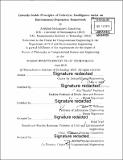| dc.contributor.advisor | Alex "Sandy" Pentland and John R. Williams. | en_US |
| dc.contributor.author | Almaatouq, Abdullah Mohammed. | en_US |
| dc.contributor.other | Massachusetts Institute of Technology. Department of Civil and Environmental Engineering. | en_US |
| dc.date.accessioned | 2019-12-13T18:52:55Z | |
| dc.date.available | 2019-12-13T18:52:55Z | |
| dc.date.copyright | 2019 | en_US |
| dc.date.issued | 2019 | en_US |
| dc.identifier.uri | https://hdl.handle.net/1721.1/123223 | |
| dc.description | Thesis: Ph. D. in Computational Science and Engineering, Massachusetts Institute of Technology, Department of Civil and Environmental Engineering, 2019 | en_US |
| dc.description | Cataloged from PDF version of thesis. | en_US |
| dc.description | Includes bibliographical references (pages 135-152). | en_US |
| dc.description.abstract | A large body of work has shown that a group of individuals can often achieve higher levels of intelligence than the group members working alone. Despite these expectations of group advantage, many examples of collective failure have been documented--from market crashes to the spread of false and harmful rumors. To reconcile these results, a major effort in the study of collective decision making has been focused on understanding the role of group composition and communication patterns in promoting the "wisdom of the crowd" or, conversely, leading to the "madness of the mob." In the past decades, much of this effort has been devoted to inferring the importance of a particular attribute, in isolation, by its capacity to explain the accuracy of collective judgments. In this thesis, we argue that such a perspective can lead to inconsistent conclusions: an 'incoherency problem.' We assert that the importance of an individual-level or structural attribute may change as a function of the environment in which the group is situated. Hence, we propose a research agenda to investigate the relative importance of the group composition and the structure of interaction networks under an environment-dependent framework. We show that under such a framework, we can reconcile previously conflicting claims from the collective intelligence literature and motivate a future research program to identify stable principles of collective performance. Although implementing such a program is logistically challenging, "virtual lab" experiments of the sort discussed in this thesis, in combination with emerging "open science" practices such as pre-registration, data availability, open code, and "many-labs" collaborations, offer a promising route forward. | en_US |
| dc.description.statementofresponsibility | by Abdullah Mohammed Almaatouq. | en_US |
| dc.format.extent | 152 pages | en_US |
| dc.language.iso | eng | en_US |
| dc.publisher | Massachusetts Institute of Technology | en_US |
| dc.rights | MIT theses are protected by copyright. They may be viewed, downloaded, or printed from this source but further reproduction or distribution in any format is prohibited without written permission. | en_US |
| dc.rights.uri | http://dspace.mit.edu/handle/1721.1/7582 | en_US |
| dc.subject | Civil and Environmental Engineering. | en_US |
| dc.title | Towards stable principles of collective intelligence under an environment-dependent framework | en_US |
| dc.type | Thesis | en_US |
| dc.description.degree | Ph. D. in Computational Science and Engineering | en_US |
| dc.contributor.department | Massachusetts Institute of Technology. Department of Civil and Environmental Engineering | en_US |
| dc.identifier.oclc | 1129586136 | en_US |
| dc.description.collection | Ph.D.inComputationalScienceandEngineering Massachusetts Institute of Technology, Department of Civil and Environmental Engineering | en_US |
| dspace.imported | 2019-12-13T18:52:54Z | en_US |
| mit.thesis.degree | Doctoral | en_US |
| mit.thesis.department | CivEng | en_US |
